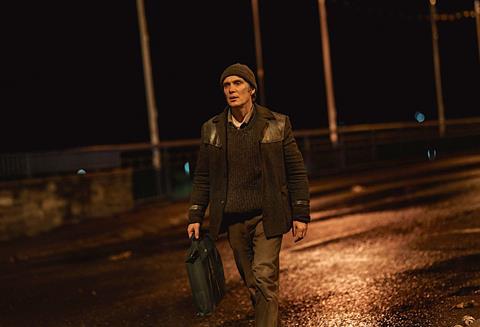Cillian Murphy is a quiet man with a conscience in 1980s Ireland in this adaptation of Claire Keegan’s novella

Dir. Tim Mielants. Ireland/Belgium. 2024. 96 mins
Cillian Murphy starred in one of the biggest films of 2023, and he starts 2024 at the opposite end of the spectrum, with super-intimate Irish drama Small Things Like These. Yet his role here isn’t altogether removed from Oppenheimer, as he again plays an introspective man dealing with his conscience in the face of a life-changing moment of insight.
A quiet boldness
Murphy’s presence will lend modest commercial traction to a sombre film that will undoubtedly be a tough sell, even given the production muscle of Matt Damon and Ben Affleck’s Artists Equity - and which, kicking off the Berlinale, may qualify as one of the most downbeat openers ever for a major festival. But Murphy’s performance, Tim Mielants’s controlled direction and subtle emotional heft combine to make this low-key adaption of Claire Keegan’s Booker-nominated 2021 novella very much a proposition to be reckoned with. The Oscar-nominated Irish-language adaptation of her earlier work ‘Foster’, The Quiet Girl, broke records in Ireland and will also ensure keen audience interest.
The setting is the town of New Ross in County Wexford, Ireland, and the time – though stated less explicitly than in the book – is the mid-80s. In the run-up to Christmas, coal and fuel merchant Bill Furlong (Murphy) is working hard to keep his clients supplied for a hard winter. By nature introspective, Catholic family man Bill has a tender if sometimes laconic rapport with his wife Eileen (Eileen Walsh) and is devoted to their five daughters, but he is manifestly something of an outsider even in his own home.
Undemonstrative and given to solitary nocturnal brooding, Bill is nonetheless empathetic and a man of conscience, only too aware that his community is going through exceptionally hard times. Carrying the world’s troubles on the battered shoulders of his donkey jacket, he is also haunted by his own past, seen in intermittent flashbacks. He was born out of wedlock, but he and his mother were given a home by Mrs Wilson (Michelle Fairley), owner of a local farmhouse. Despite her tenderness, Bill (played as a boy by Louis Kirwan) suffers from exclusion and bullying by his peers; from seemingly small but nevertheless significant disappointments when it comes to Christmas presents; and from the pain of not knowing who his father is (this enigma, however, is addressed much earlier than in the book, somewhat shifting the emphasis of the drama).
Bill’s awareness of his mother’s story affects his responses when he discovers a young woman hiding in the coal shed of the local convent. Taking her back indoors to safety - or so he thinks - he is invited to a fireside chat by Sister Mary, the Mother Superior, played by Emily Watson in a mesmerising display of seemingly benign but utterly authoritarian menace. Watson gives a quietly chilling performance, and it’s understandable that Bill shrinks into himself like a terrified child in her presence: as spoken by her, the words, “We’ll have some tea” have never sounded so ominous.
The background is the historic treatment in Ireland of young single mothers, specifically the existence of the notorious Church-run Magdalene Laundries - in effect, punitive workhouses that existed until as recently as 1996. The film is devoted to all the young women and their children who suffered, and in many cases died, as a result of those institutions.
Playwright and screenwriter Enda Walsh, whose cinema work notably includes Steve McQueen’s Hunger, offers a largely faithful adaptation of Keegan’s slim but highy crafted text, often teasing out potent visual cues from seemingly incidental references. In a cast bringing richly charged resonance to the spare dialogue, Eileen Walsh is particularly effective in her scenes with Murphy, as a mother and wife who cares deeply for her own but wants to ensure the safe status quo of her enclosed world. And Murphy, further expanding into psychologically sombre middle-aged roles, is compelling throughout, all the more so because of his character’s absolute reserve. Subtly, Murphy limns the emotional make-up of a life that combines success and domestic contentment on one hand with, on the other, everyday disappointment and unhealed childhood scars.
Belgian director Mielants – whose last film was wartime drama WIL, and whose extensive TV work includes directing Murphy in Peaky Blinders - here adapts convincingly to an Irish environment and themes, moving an unimaginable distance away from the eccentricity of his 2019 nudist camp comedy Patrick. Small Things is tightly controlled in mood and feel, only straying into more conventional period register in the childhood flashbacks. Mielants and DoP Frank Van den Eeden give a profoundly wintry feel to a small world deeply ingrained with coal and condensation; a repeated image of Bill washing the day’s dirt off his hands acquires powerful metaphorical effect in this narrative context.
Working with production designer Paki Smith, Mielants also manages to capture a specific moment of the recent past without overstressing the effect, with sparse period notations provided by the odd pop hit and briefly glimpsed TV excerpts. The open ending, faithful to the book, is another touch of the quiet boldness that the film has in common with its protagonist.
Production companies: Big Things Films, Artists Equity
International sales: FilmNation, nyoffice@filmnation.com
Producers: Alan Moloney, Cillian Murphy, Catherine Magee, Matt Damon, Drew Vinton
Screenplay: Enda Walsh, based on the novella by Claire Keegan
Cinematography: Frank Van den Eeden
Editing: Alain Dessauvage
Production design: Paki Smith
Music: Senjan Janson
Main cast: Cillian Murphy, Eileen Walsh, Michelle Fairley, Emily Watson

























No comments yet